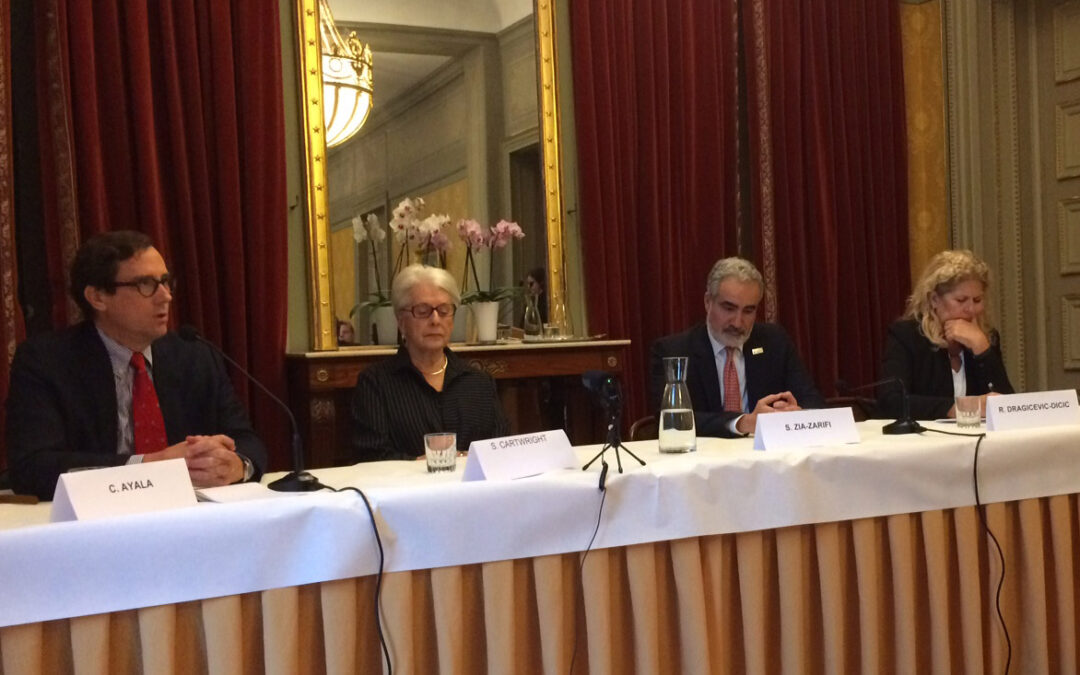
Oct 23, 2018 | Multimedia items, News, Video clips
At an event at the city’s Palais Eynard, prominent ICJ Commissioners discussed the supremacy of the Rule of Law and also why it is important to be in Geneva. Watch the video.
The Executive Committee (ExCo), representing the whole Commission of Jurists, participated in the event.
Sam Zarifi, ICJ Secretary General, opened the event by reiterating the importance for the ICJ to be headquartered in Geneva, not only for the UN and international community but also for the city’s and canton’s legal and human rights community.
“It is absolutely clear that we live at a moment in the world when lawyers, judges, jurists are under attack and it is important for the legal community across the world, regardless of borders, regardless of languages, regardless of legal systems, to come together to defend the notion of the rule of law and defend the security and well-being of lawyers and jurists around the world.”
Carlos Ayala, ICJ’s Vice-President, said the ICJ was a unique organization working in the field of the Rule of Law, not as an isolated notion but within the framework of Human Rights and democracy.
He explained how the ICJ is structured and working around the world and insisted on the impact the ICJ is having through its activities.
He said that the organization’s legal outputs were used to have an impact on the overall human rights situations, cases, court decisions, and in training judges, lawyers, prosecutors and others.
Radmila Dragicevic-Dicic, also ICJ’s Vice-President, insisted on how it is important to share experiences about human rights issues and finding solutions to protect different rights.
She gave her personal example of being a judge in former Yugoslavia and Serbia to show how with tenacity and courage one can help establish an independent judiciary even in some of the hardest situations.
She testified how she was helped by the ICJ and Switzerland in her fight for justice.
“If you fight for independence of judges and lawyers in your country, you fight for judges and lawyers everywhere,” she added.
Dame Silvia Cartwright, ICJ Commissioner and ExCo member from New Zealand, was the first woman appointed to the High Court in New Zealand and she was also Governor General of New Zealand.
She said that she was privileged to come from a country that has always promoted and protected the Rule of Law but that unfortunately many recent examples showed that this endorsement could change overnight.
Very active in the fight for women’s rights she said how through her professional work she realized the terrible impact that the Khmer Rouge’s regime in Cambodia and civil war in Sri Lanka had on women.
“Generally speaking I’m quite pessimistic because I think we have reached another stage of the cycle that seems to occur every couple of generations where we are heading towards a more fascist world. So this is the time when human rights must be protected when we must fight to maintain the norms we have struggled for so long,” she said.
Watch the full event here:
https://www.facebook.com/ridhglobal/videos/335212527229422/
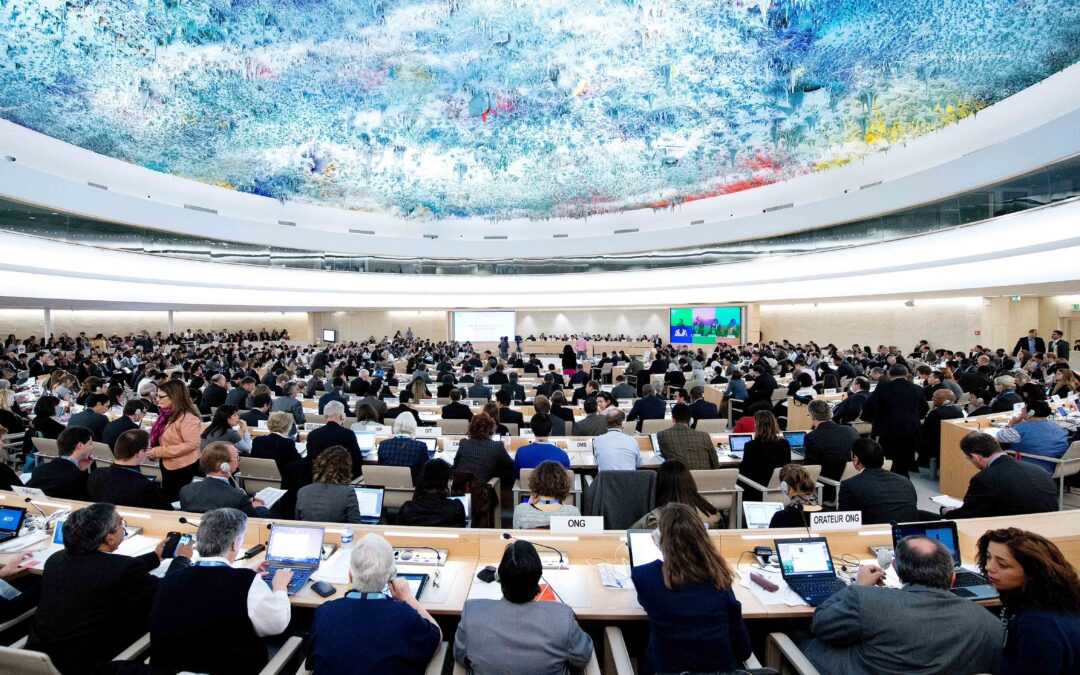
Oct 19, 2018 | Advocacy, Non-legal submissions
The International Commission of Jurists participated in the fourth session of the open-ended intergovernmental working group on transnational corporations and other business enterprises with respect to human rights that took place at the Palais de Nations from 15-18 October 2018. Below are the interventions the ICJ made at this session.
UN-ICJ statement IGWG4 general debate-Advocacy-ENG-2018
UN-ICJ statement IGWG4 prevention-Advocacy-ENG-2018
UN-ICJ statement IGWG4 legal liability-Advocacy-ENG-2018
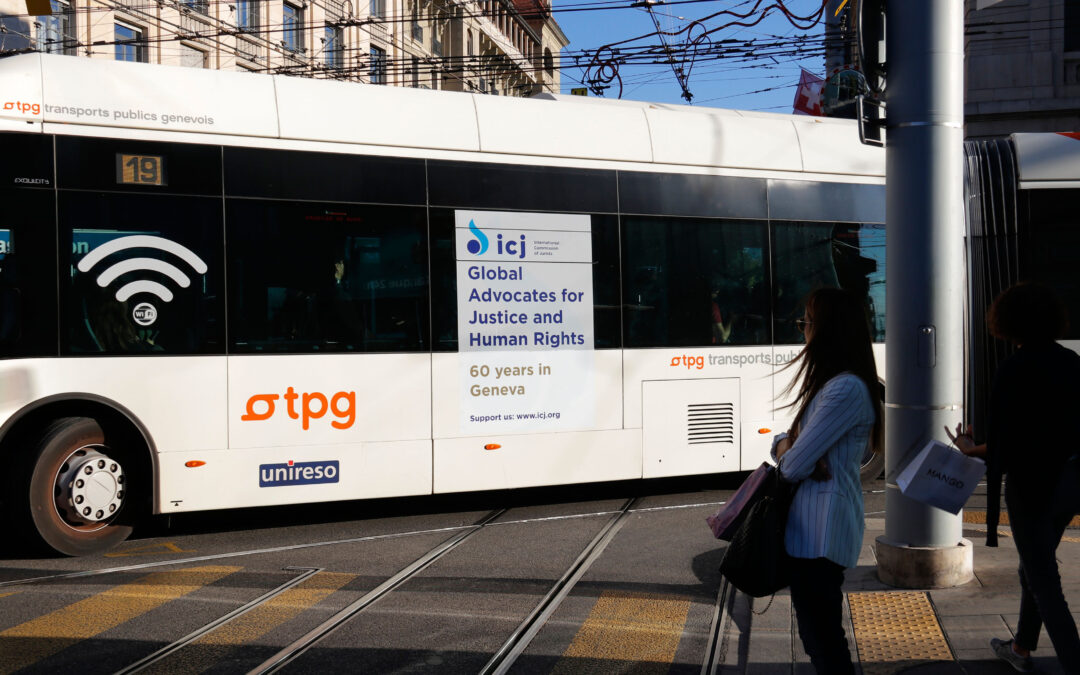
Oct 5, 2018 | News
2018 marks the 60th anniversary of the ICJ’s move to Geneva thanks to the great Swiss jurist Jean-Flavien Lalive, who was ICJ’s Secretary General in 1958.
This makes the ICJ one of the earliest international organizations to establish its headquarters in Geneva.
At the 1959 ICJ Congress in New Delhi, Dr. Lalive helped breathe new life into the rule of law and human rights.
The Delhi Declaration is, to date, a fundamental instrument interpreting the rule of law as a living concept, and underscoring the primary role of lawyers in its safeguard and in the advancement of human rights.
The ICJ plays a unique and preeminent role as a non-governmental organization seeking to defend human rights and the rule of law worldwide.
The ICJ will mark this event with two major initiatives:
- A visibility campaign from 26th September to 9th October: the TV screens on the Geneva public transport network and five vehicles will carry the slogan “Global Advocates for Justice and Human Rights – 60 years in Geneva”
- The launch of the “60th Anniversary Appeal” to all lawyers in the Republic and canton of Geneva to support the ICJ and, in turn, their less privileged colleagues, victims of persecution on five continents.
“Geneva can be proud of its image as the world human rights capital. It is a beacon for justice advocates around the world. We must continue to make it shine,” said Sam Zarifi, Secretary General of the ICJ.
“Through its 60-year history, the ICJ has contributed significantly to Geneva’s human rights record: the campaigns that led to the creation of the post of UN High Commissioner for Human Rights in 1993 and the UN Human Rights Council in 2006, as well as the adoption of the United Nations Convention against Torture in 1984 are some emblematic examples,” said Olivier Coutau, Head of La Genève Internationale.
“In the face of repeated attacks on human rights, the world needs, more than ever the ICJ’s competent, rigorous and effective defense of the rule of law,” Sam Zarifi added.
The Republic and canton of Geneva support the ICJ 60th Anniversary Appeal.
Additional information
The international reputation of the ICJ rests on these pillars:
- 60 Commissioners – eminent judges and lawyers – from all regions of the world and all legal systems – with unparalleled knowledge of the law and human rights;
- Cooperating with governments committed to improving their human rights performance;
- Effective balance of diplomacy, constructive criticism, capacity building, and if necessary, ‘naming and shaming’;
- Unmatched direct access to national judiciaries, implementing international standards and improved legislation impacting millions;
- Guiding, training and protecting judges and lawyers worldwide to uphold and implement international standards;
- Working for access to justice for victims, survivors and human rights defenders, in particular from marginalized communities;
- Following a strict result based management in project delivery.
In recognition of this effective approach, the ICJ has been awarded, during its long history, some of the most prestigious international awards: the Council of Europe Human Rights Prize, the United Nations Award for Human Rights, Erasmus Prize, Carnegie Foundation Wateler Peace Prize.
In 2018, the ICJ provided local trainings on five continents to assist 4,300 judges, lawyers and prosecutors strengthen their ability to protect and promote fundamental rights.
The ICJ has consultative status with the United Nations Economic and Social Council, UNESCO, the Council of Europe and the African Union.
Contact :
Michaël W. Sombart, Director Philanthropy & Strategic Partnerships, t: +41 22 979 38 31 ; m: +41 77 965 98 45 ; e: michael.sombart(a)icj.org
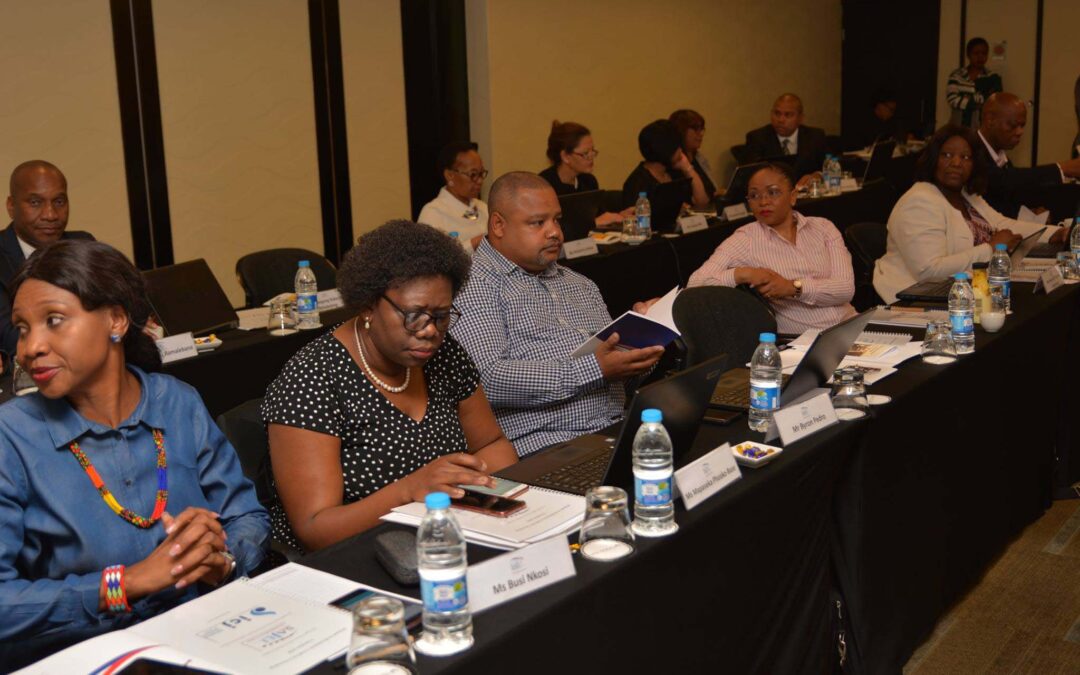
Oct 3, 2018 | News
Today, the South African Judicial Education Institute (SAJEI) and ICJ held a workshop for judicial officers on housing rights in terms of South African and international human rights law.
The workshop, which was held in Johannesburg, was attended 46 participants from South Africa’s 9 provinces. It formed part of a “Human Rights Week For Judicial Officers” run by SAJEI, which on other days also covered “Refugee Rights”, “LGBTI Rights”, and “Gender and HIV”.
The objective of the SAJEI-ICJ workshop was to discuss the role of judicial officers in housing rights cases.
The content of the workshop was collaboratively determined in consultation with magistrates responsible for conducting the training of other magistrates around the country.
It sought to respond to their requests information and resources to assist in their daily decision-making.
The workshop was facilitated by a range of magistrates from around the country and judicial educators at SAJEI.
A keynote address on “Constitutional Imperatives on Rights to Housing” was presented Judge Antonie Gildenhuys, a retired judge who sat both on the High Court and the Land Claims Court in South Africa.
Workshop facilitators drew on a draft manual on housing rights, which the ICJ is working with SAJEI and a working group of magistrates to develop.
The manual’s particular focus is on international human rights standards from a range of sources including the International Covenant on Economic Social and Cultural Rights, general comments of the Committee on Economic, Social and Cultural Rights.
It is hoped that, when finalized, magistrates will be able to draw on this manual to assist in their adjudication of housing rights cases.
To assist judicial officers in understanding the challenges faced by communities advocating to prevent unlawful evictions and secure access adequate housing, Mr Thapelo Mohapi (General Secretary of Abahlali baseMjondolo) and Ms Susan Mkhwanazi (Slovo Park Community Forum) were asked to make presentations on their “lived experiences” in attempting to access protection on the right to housing.
Their important insights contributed immensely to the success of the workshop and were well received by the magistrates.
Opening remarks were delivered by Dr Gomolemo Moshoeu (CEO of SAJEI) and Mr Arnold Tsunga (Africa Director of the ICJ).
“We at the ICJ are very happy that the magistrates expressed a desire for more continuous legal education in the area of legal enforcement of economic and social rights given that historically very little attention has been paid to equipping magistrates with requisite information and resources to ensure consistent application of human rights standards in this area,” reflected Arnold Tsunga after the event.
Contact:
Timothy Fish Hodgson, ICJ Legal Adviser, t: +27828719905 ; e: timothy.hodgson(a)icj.org
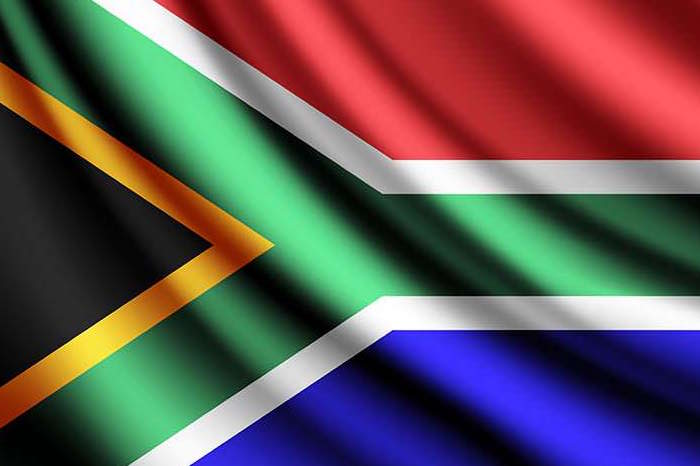
Oct 1, 2018 | Advocacy, Non-legal submissions
Today, the ICJ makes a submission to the UN Committee on Economic, Social and Cultural Rights in advance of Committee’s examination of South Africa’s initial periodic report under the International Covenant on Economic, Social and Cultural Rights.
South Africa ratified the Covenant in 2015. This is the first time that the Committee has the opportunity to review a report from South Africa on the implementation of its Covenant obligations.
The ICJ’s oral submissions will focus on the rights to work and an adequate standard of living.
The ICJ’s full written submissions also include emphasis on the rights to education, work and housing of persons with disabilities and recommend that the Committee recommend that the Government of South Africa make time-bound commitments to participative processes leading to:
1. The full domestication of Covenant in South African law
2. A comprehensive review of South Africa’s domestic laws and policies on ESC rights to ensure that they are implemented consistently with South Africa’s obligations in terms of the Covenant; and
3. The ratification of Optional Protocol to the International Covenant on Economic, Social and Cultural Rights.
In a joint statement with other civil society organizations, ICJ Legal Adviser Timothy Fish Hodgson said: “Unlike the South African Constitution, the International Covenant on Economic, Social and Cultural Rights contains a right to work. By ratifying the Covenant in 2015, the government has made a legally binding commitment to progressively eliminate unemployment and ensure that all work – whether in the formal or informal sector – is decent work.”
“As a result, for example, “both the level of the national minimum wage and measures taken by the government to combat South Africa’s 37.2% unemployment rate, should be evaluated in terms of the rights to work and the right to an adequate standard of living,” he added.
The ICJ’s oral submission is available here: South Africa-South Africa Review-Advocacy-Non Legal Submission-2018-ENG
The ICJ’s full written submissions are available here
The South African government’s full report to the Committee is available here
A live stream for the Committee’s proceedings is available here







